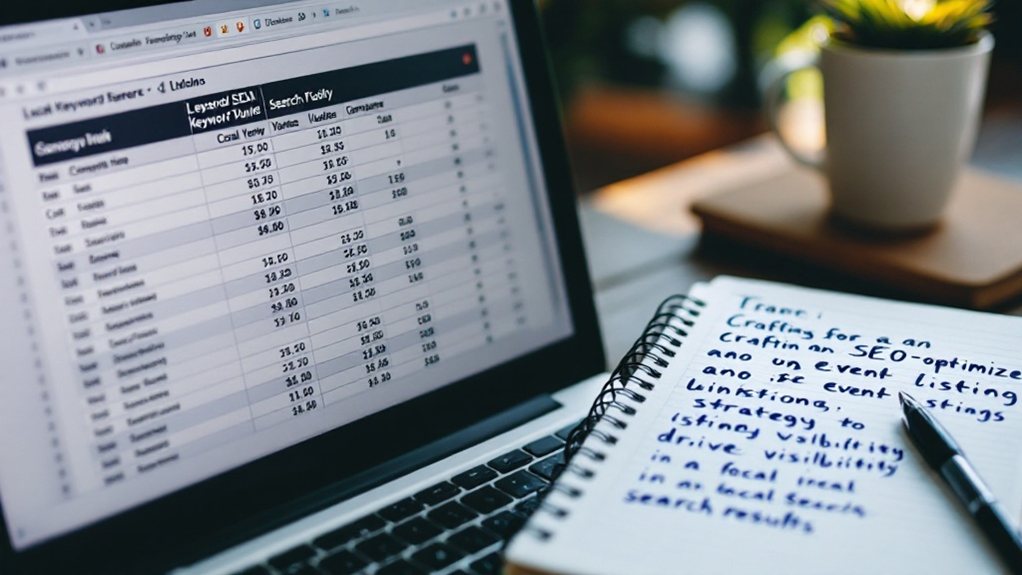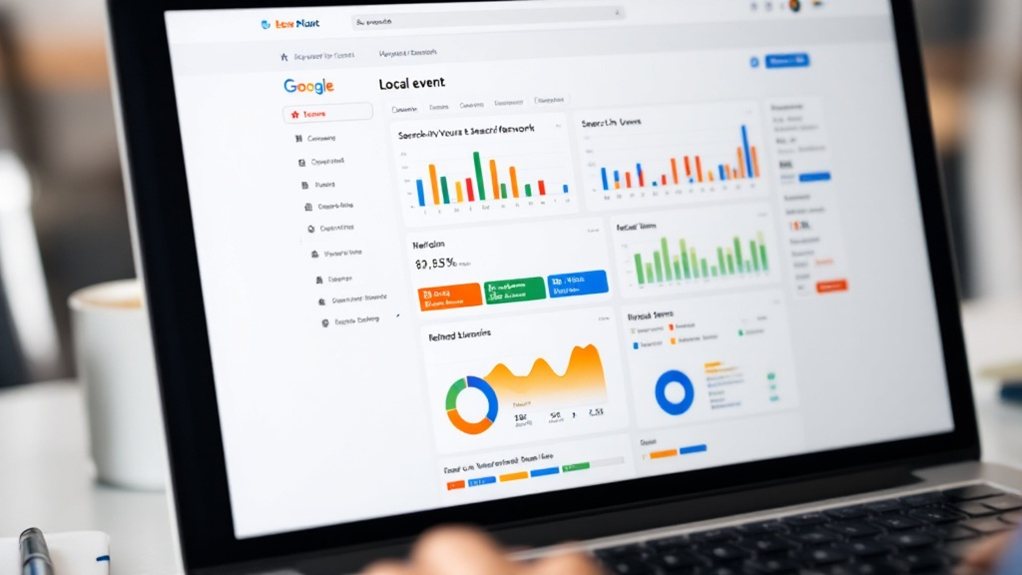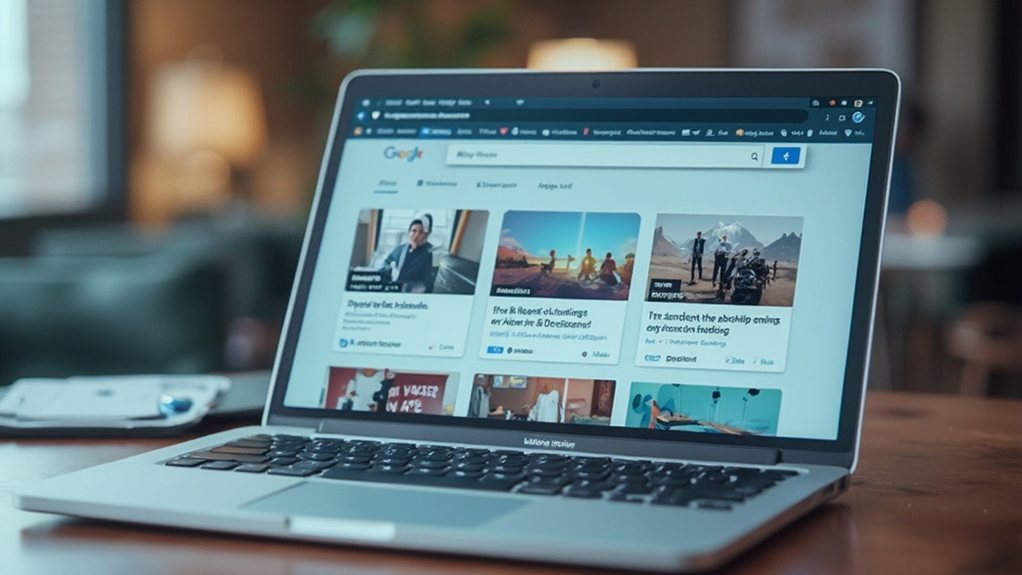To craft SEO-optimized event listings for local search, start by understanding different keyword types and leveraging tools like Google Keyword Planner. Build buyer personas to tailor your content, and incorporate long-tail keywords that align with user intent. Utilize Google Autosuggest to uncover popular search terms, and enhance listings with schema markup. Expand visibility through ticketing platforms, ensure accurate timing, and track performance to continuously refine your strategy. Keep reading to dive deeper into optimizing your event listings for local search success.
Crafting a Winning Keyword Strategy

How can you craft a winning keyword strategy for your event listings? Start by understanding different keyword types – short-tail, long-tail, informational, and transactional – and how they impact visibility. Optimizing the event listing for the event carousel and enhancing the visibility of the event online can boost awareness and attendance. Find keywords related to your event's theme and location, and tailor them to your target audience. Regularly review and update your listings with new, trending keywords to maintain relevance. Place primary keywords in titles and descriptions, integrate them naturally throughout the content, and use synonyms to avoid repetition. Leverage event tags, long-tail phrases, and modifiers to attract specific audiences. Monitor performance using tools like Google Search Console, and refine your strategy based on metrics like click-through rate and conversion tracking.
Leveraging Keyword Research Tools

Discover the right keywords to drive traffic to your event listings by using research tools like Google Keyword Planner and Google Trends. Keyword research reveals insights into audience interests and search behaviors. Explore competitor targeting and leverage Google's autosuggest to uncover long-tail keywords that your audience is searching for. Analyze the search engine results pages (SERPs) to understand the type of content that's ranking for your target keywords.
Discover Relevant Keywords
Why utilize keyword research tools to uncover the most relevant keywords for your event listings? These tools provide invaluable insights into search volumes, trends, and competition. Start with the free Google Keyword Planner to gauge interest in your event topics. Then, explore advanced tools like Ahrefs and Semrush to identify keyword gaps and opportunities. Analyze metrics like search volume, keyword difficulty, and competitor rankings to prioritize the most impactful keywords. Regularly refine your keyword lists based on performance data, ensuring your event listings remain optimized and relevant. Leveraging the right keywords can significantly boost your visibility in local search results, driving more qualified traffic to your event pages.
Utilize Google Autosuggest
Leveraging Google Autosuggest can provide invaluable insights for optimizing your local event listings. This powerful tool suggests search queries based on popularity and user intent, helping you identify keywords that resonate with your target audience. By analyzing the auto-complete suggestions, you can uncover common phrases and questions related to your event, allowing you to incorporate them seamlessly into your listings. Additionally, the Google Autocomplete Algorithm is powered by RankBrain, which helps users get better results. Geographical factors influence autosuggest results, so you can tailor your keywords to specific locations. Combine autosuggest data with keyword research tools like Google Keyword Planner to refine your strategy and ensure your event listings appear prominently in local search results.
Analyze Competitor Targeting
Analyzing your competitors' keyword targeting strategies can provide invaluable insights for optimizing your own event listings. Look for keywords they're using in their website content and meta tags, particularly those focused on your local market. Identify your top competitors by searching for event planning-related keywords combined with your city or region. Examine their local business listings to uncover their visibility strategies. Assess their content marketing efforts, like blog posts or social media, to understand how they're leveraging SEO. Leverage keyword research tools to analyze their keyword choices, target long-tail keywords, and identify gaps in their strategies that you can capitalize on. Utilizing local SEO is a more cost-effective marketing strategy than traditional paid advertising.
Understanding Your Target Audience

Crafting buyer personas based on the provided demographic insights can help you target your marketing efforts more effectively. By understanding the preferences and behaviors of your key audience segments, such as Gen Z and Millennials, you can tailor your event listings and promotional content to resonate with them. More than half of event attendees want to attend more events in 2024 compared to 2023. Leverage the insights on event types, location preferences, and social media usage to optimize your search engine optimization (SEO) strategies and reach your target attendees.
Persona Development Insights
Understanding your target audience's needs and preferences is paramount when developing effective buyer personas. The process involves researching and analyzing customer behaviors, goals, and challenges. Consider the following persona development insights:
- Identify demographic factors like age, gender, income, and education that influence user behavior and search queries. Persona Development Insights
- Uncover psychographic data such as values, interests, and decision-making processes to craft compelling marketing messages.
- Segment the audience based on unique attributes and behaviors, tailoring content to meet the specific needs of each subgroup.
- Continuously update personas based on feedback to ensure they remain relevant and guide your SEO strategies effectively.
Keyword Targeting Strategies
Effective keyword targeting hinges on a deep understanding of your target audience. Segment your audience based on demographics and interests to identify the most relevant keywords. Incorporate event-related keywords that align with your industry or theme to improve visibility. Use location-specific keywords for local events to reach your intended geographic market. Analyzing competitor keywords can provide valuable insights to refine your keyword strategy. Monitor search trends and audience feedback to continuously refine your keyword strategy. By tailoring your keywords to match your audience's search intent, you'll enhance the relevance of your event listings and increase the likelihood of attracting the right attendees. Stay agile and responsive to keep your keyword targeting sharp and effective.
Optimizing With Long-Tail Keywords
Why should you optimize your event listings with long-tail keywords? Long-tail keywords are more specific, align better with user intent, and can improve your search result rankings. Understanding the shift to topic clusters is critical for keyword research. Here are 4 key benefits:
- Higher conversion rates by targeting precise user needs.
- More cost-effective paid advertising with lower cost-per-click.
- Increased relevance for local searches through location-specific keywords.
- Ability to create tailored content that matches long-tail keyword queries.
To capitalize on these advantages, incorporate your primary long-tail keywords into titles, headings, meta descriptions, and content. Complement them with related synonyms and LSI keywords to create truly SEO-optimized event listings for local search success.
Tapping Into Google Autosuggest
Google Autosuggest is a powerful tool that can unlock valuable insights for optimizing your event listings. Pay attention to the phrases Autosuggest surfaces – they reflect common user search behaviors and can enhance your event's visibility. Leverage these Autosuggest keywords strategically throughout your content to improve your rankings and reach the right audience.
Mining Autosuggested Phrases
Understanding the functionality and use cases of Google Autosuggest can provide valuable insights for event organizers seeking to optimize their event listings for local search. By analyzing the suggested phrases, you can identify:
- Popular search terms related to your event type and location.
- Alternative keywords and phrases potential attendees might use.
- Seasonal or timely keywords that can boost visibility during specific periods.
- Variations on your event's name or description that may be more discoverable.
Leveraging these Autosuggest insights can help you create more targeted and user-friendly event listings, improving their discoverability in local search results.
Leverage Autosuggest Keywords
How can you leverage the power of Google's Autosuggest feature to optimize your event listings for local search? By tapping into the high-intent keywords revealed by Autosuggest, you can gain a competitive advantage. Identify influential phrases related to your events, such as "events near me," and incorporate them naturally into your titles, descriptions, and meta tags. Analyze competitors' Autosuggest terms to uncover under-optimized opportunities. Group related keywords to create content clusters and enhance relevance. Consider device and platform preferences to tailor your approach. Prioritize local optimization and structured data to boost visibility in local search results. Monitor performance and refine your strategy to stay ahead of the curve.
Optimizing for Autosuggest Results
As a savvy event organizer, you can leverage the power of Google's Autosuggest feature to optimize your event listings for local search. By understanding the mechanics of Autosuggest, you can ensure your events appear in the predictive search results.
- Incorporate high-volume keywords and local modifiers into your event titles and descriptions to increase visibility.
- Monitor search trends and create content that aligns with user intent to maintain relevance.
- Encourage online mentions and engagement to boost your event's presence in Autosuggest.
- Optimize your Google My Business listing to align your local SEO efforts with Autosuggest predictions.
Structuring Content for Readability
Structuring content for readability is paramount when it comes to captivating your audience. Use straightforward and concise writing, avoiding complex sentences unless necessary. Keep paragraphs short for better comprehension, and employ descriptive headings to summarize content sections. Optimize font size and color for maximum visibility. By simplifying your language and breaking up long texts into manageable sections, you'll ensure your event listings are easy to skim and understand. Incorporate visual elements like images or diagrams, and use bullet points for easy list comprehension. Following these best practices will help you create SEO-optimized event listings that engage and inform your local audience.
Enhancing Event Listings With Schema Markup
While ensuring your event listings are structured for readability is crucial, further enhancing them with schema markup can significantly improve their visibility and user experience. Schema markup provides search engines with detailed information about your events, enabling rich snippets that grab users' attention. To implement event schema markup effectively, consider the following:
- Use the JSON-LD format, the primary schema markup format supported by Google.
- Include essential details like event name, start date, and location, and consider adding optional fields like end date, description, and ticketing information.
- Regularly check Google's guidelines to maintain eligibility for rich results.
- Combine event schema with your Google Business Profile to maximize local search visibility.
Expanding Visibility Through Ticketing Platforms
Expanding your event's visibility doesn't stop at optimizing listings with schema markup. Leveraging ticketing platforms like Eventbrite is crucial. These platforms drive 33% of attendees and offer integrated marketing features, boosting your event's reach. Utilize their social media and email integrations to connect with a wider audience. Real-time analytics provide insights for pricing and promotion decisions. Plus, seamless ticket purchasing enhances convenience for consumers. Coupling local SEO with strategic use of ticketing platforms can significantly amplify your event's visibility and attendance. Embrace the power of these platforms to expand your reach and drive ticket sales.
Ensuring Accurate Timing Information
Ensuring accurate timing information for your event is crucial, as it directly impacts the credibility and overall experience for participants. By leveraging cutting-edge timing technologies, like RFID chips, Finish Lynx camera systems, and UHF timing, you can capture precise results that build trust and enhance the event's success. Consider these four key benefits:
- Fairness in competition: Accurate timing ensures a level playing field for all participants.
- Credibility boost: Precise timings demonstrate your event's professionalism and commitment to excellence.
- Engaging experience: Live results keep participants and spectators invested throughout the event.
- Reliable data: Participants can trust the timing information they receive, enhancing your event's reputation.
Tracking and Analyzing Listing Performance
Consistently monitoring and analyzing the performance of your event listings is crucial for optimizing their visibility and effectiveness. Utilize key metrics like impressions, clicks, click-through rates, and conversion rates to gauge your listing's performance. Additionally, track bounce rate and time on page to assess user engagement and the relevance of your event details.
| Metric | Definition | Importance |
|---|---|---|
| Impressions | The number of times your listing is shown | Measures visibility |
| Clicks | The number of times users click on your listing | Indicates engagement |
| Click-Through Rate (CTR) | Clicks divided by impressions | Assesses listing relevance |
| Conversions | Ticket sales, registrations, or sign-ups | Evaluates success of listings |
| Bounce Rate | Percentage of users who leave without further interaction | Identifies user experience issues |
Continuously analyze this data to make informed decisions and refine your event listing optimization strategies.
